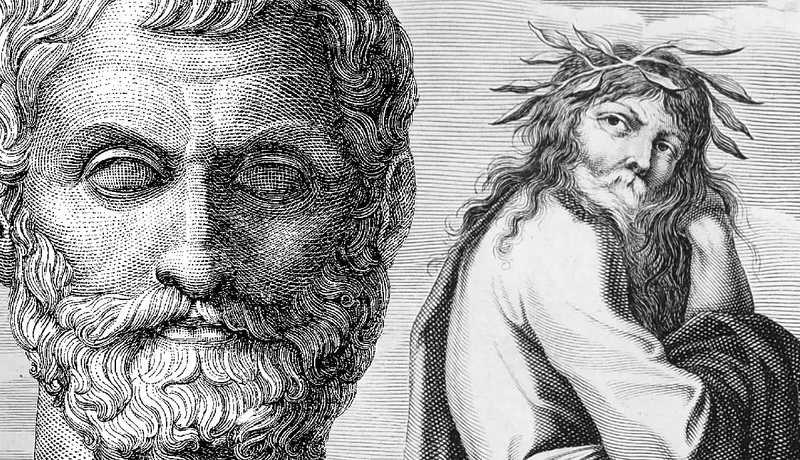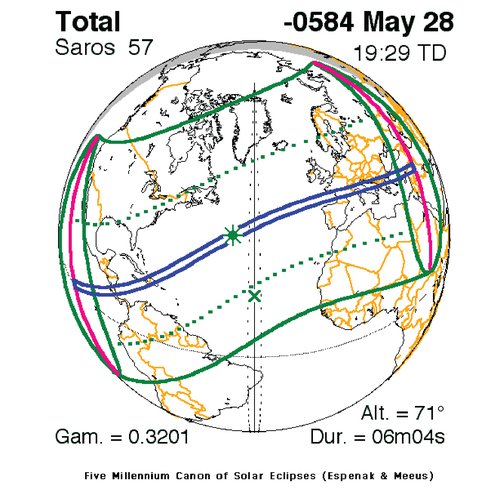The First Predicted Eclipse
According to the ancient Greek historian Herodotus, the eclipse of Thales was the earliest recorded instance of a predicted solar eclipse, possibly occurring on May 28, 585 B.C. Thales' method of prediction remains uncertain, though some suggest he recognized patterns in eclipse occurances. His prediction is a celebrated event in the history of Greek science.
Born in 620 B.C., Thales of Miletus was a Greek philosopher and mathematician who has been called the father of western philosophy. In fact, he was said to be among the first to engage in mathematics, science and deductive reasoning. He is known as one the first presocratic philosophers and one of Plato's Seven Sages of Ancient Greece. Aristotle considered him the first philosopher and also his predecessor. Thales is still studied and revered by the most respected scientists in modern times.

A composite of renderings of Thales, by Wilhelm Meyer, 1875; with Thales, by Jean Couvay after Claude Vignon, ca. 1639-1640
The idea arose that nature follows consistent principles that could be deciphered. And so began the long process of replacing the notion of the reign of gods with the concept of a universe that is governed by laws of nature, and created according to a blueprint we could someday learn to read.”
It wasn't just the prediction that made the history books, but this eclipse marked a profound moment in ancient history, halting a long and fierce battle between the armies of King Aylattes of Lydia (modern Turkey) and King Cyaxares of the Medes (modern Iran), often referred to as the Battle of the Eclipse. This celestial event brought about an abrupt cessation of hostilities, prompting both sides to lay down their arms and declare a truce.
How did he predict the eclipse? The method Thales used for his alleged prediction remains unknown, with speculation suggesting he may have borrowed techniques from the Egyptians or Babylonians.
Thales may have used the Babylonian Saros cycle which is used to predict eclipses. It is an astrological pattern between the Earth and Moon which has a duration of 223 lunar months, i.e., 18 years and 11 and 1/3 days or 6,585.3 days. A lunar month is the time it takes for the Moon to return to its current phase.

In addition to Herodotus' account, several other ancient Greek and Roman sources corroborate Thales' prediction. Diogenes Laërtius notes Xenophanes' admiration for Thales' feat, along with testimonies from other pre-Socratic philosophers Democritus and Heraclitus. Cicero attributes the prediction to Thales during the reign of Astyages, the last Median king, while Pliny the Elder credits him with predicting a solar eclipse during the reign of Alyattes of Lydia.
Regardless of the method he used or even if it was true, Thales' prediction represents a significant milestone in the history of science, reflecting an early attempt to understand science and celestial phenomena.
